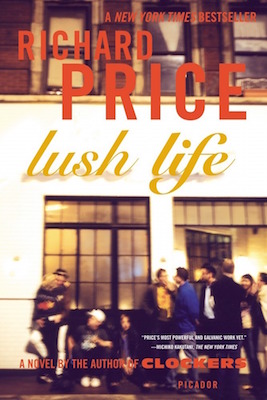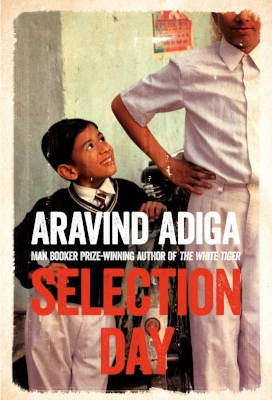Adam Vitcavage liked lists long before Buzzfeed figured out how to monetize them. Now he wants to share his love of lists with you. Each week, he’ll round up a list featuring anything anything pop culture related from literature to music to cool designers that you should buy prints from. Welcome to LISTcavage.
Each year, hundreds of books end up making a variety of “best of” lists across print and the Web (including Daniel Ford’s top 35 books of 2017). With each passing year, it seems like some of these amazing books get left on the bottom shelf in personal libraries covered in dust. Here are 10 fiction novels from a decade ago that are worth revisiting or reading for the first time if you missed them the year “High School Musical 3” hit cinemas.
The White Tiger by Aravind Adiga (2008 Man Booker Award winner)
What’s the story? Balram is a poor rickshaw driver who uses his wit to climb India’s entrepreneurial and social ladder.
What did critics think then? “Balram's appealingly sardonic voice and acute observations of the social order are both winning and unsettling,” (The New Yorker); "Fierce and funny...A satire as sharp as it gets,” (The Seattle Times); “One of the most powerful books I've read in decades. No hyperbole,” (USA Today).
That’s great, why should I read it now? Out of the books I’ve read set in India, this one was one of two where I felt completely transported to the country. Adiga’s prose hits all five senses as he lets us navigate the world with Balram.
Olive Kitteridge by Elizabeth Strout (2009 Pulitzer Prize winner)
What’s the story? Linked short stories reveal the life of the stern title character in a rural Maine town.
What did critics think then? “Funny, wicked and remorseful, Mrs. Kitteridge is a compelling life force, a red-blooded original,” (The San Francisco Chronicle); “Rarely does a story collection pack such a gutsy emotional punch,” (Entertainment Weekly); “Perceptive, deeply empathetic,” (O: The Oprah Magazine).
That’s great, why should I read it now? Interconnected short stories are fairly common, but Stout was able to write completely fresh tales that individually stand out while also having a tight cohesion others have failed at.
Home by Marilynne Robinson
What’s the story? An alcoholic returns home after two decades away as he begins to bridge the gap between him and his father, the town’s beloved reverend.
What did critics think then? “A literary miracle,” (Entertainment Weekly); “An exquisite, often ruefully funny meditation on redemption,” (Vogue); “Its last fifty pages are magnificently moving,” (The New Yorker).
That’s great, why should I read it now? Robinson’s sense of place in all of her work is top notch. She is a master of immersion and she’s at her pinnacle with this novel.
Mudbound by Hillary Jordan
What’s the story? Set in the 1940s Jim Crow South, the novel focuses on the racism and prejudice in Mississippi and what it means to be a man.
What did critics think then? “The novel's inevitable closing scenes are painfully violent, utterly memorable and surprisingly rich in cultural metaphor and well-wrought literary ploy,” (Rocky Mountain News); “A superbly rendered depiction of the fury and terror wrought by racism,” (Publishers Weekly)
That’s great, why should I read it now? It was just made into a well-received Netflix film, but, like always, the novel is considerably better.
The Invention of Everything Else by Samantha Hunt
What’s the story? Part historical fiction, part biography, part science fiction. These genres are blended to reveal the hidden truth of Nikola Tesla’s life.
What did critics think then? “Full of vivid imagery, sounds, memories, and dreams, this novel is a sweet story of just how normal it is to be different,” (Boston Globe); “It is a rare thing for a writer to conjure belief and true understanding, but with The Invention of Everything Else, Samantha Hunt has accomplished exactly that,” (Philadelphia Inquirer); “Oddly charming and pleasantly peculiar,” (Booklist).
That’s great, why should I read it now? Hunt’s ability to take the normal and find something haunting and magical is a true gift. She discovers her talent here. It’s a true treat to see this novel compared to her most recent efforts of Mr. Splitfoot and The Dark Dark.
The Believers by Zoë Heller
What’s the story? After a man has a stroke, his wife discovers a secret that will change how she viewed her marriage and entire life. Then her children find out and everyone’s world gets turned upside-down.
What did critics think then? “Heller astutely delves into the deepest, most uncomfortable areas of human nature,” (Bookmarks Magazine); “This novel showcases her copious gifts, including a scathing, Waugh-like wit,” (The New York Times).
That’s great, why should I read it now? Heller is a masterful writer that should be studied. This might not be her greatest work, but every writer should read what works for an author as well as what falls a little flat.
The Widows of Eastwick by John Updike
What’s the story? A sequel to the famed Witches of Eastwick that takes place three decades later.
What did critics think then? “Ingenious . . . This isn’t writing. It is magic,” (The New York Times Book Review); “Here’s a bet his work will keep fresh for generations, inciting laughter, wonder and sensuous shivers,” (Los Angeles Times).
That’s great, why should I read it now? It’s Updike’s last novel released prior to his 2009 death. Give the man some respect.
Lush Life by Richard Price
What’s the story? A crime novel in Manhattan’s Lower East Side that starts off straightforward, but quickly sprawls into a modern social commentary.
What did critics think then? “Richard Price knows how crime sounds and smells,” (Esquire); “One of the best writers of dialogue in the history of American literature,” (The New York Review of Books); “Deftly written… beautifully expressive,” (Los Angeles Times).
That’s great, why should I read it now? If you’re a crime suspense fan, this is a case study for the ages. The dialogue in particular proves Price still has it after decades in the business.
When Will There Be Good News? by Kate Atkinson
What’s the story? One of those stories where three lives unexpectedly come together to transform the trajectory of their future.
What did critics think then? “Meticulously plotted and affecting thriller,” (Miami Herald); "Uncategorizable, unputdownable, Atkinson's books are like Agatha Christie mysteries that have burst at the seams-they're taut and intricate but also messy and funny and full of life,” (Time).
That’s great, why should I read it now? Atkinson knows how to keep readers guessing about what happens next. Her two most recent releases overshadow this book, but it should make its way onto your bookshelf; especially if you’re a fan of those two bestsellers everyone seemingly has read.
A Mercy by Toni Morrison
What’s the story? A historical coming-of-age story about a young woman during the infancy of the slave trade in the 1600s.
What did critics think then? “A poetic, visionary, mesmerizing tale,” (Vanity Fair); “A masterpiece of rewarding complexity,” (The Sunday Times); “Perhaps the greatest pleasure of the book lies in drawing one in so completely; there are no places where faulty construction hurls us back into reality,” (California Literary Review).
That’s great, why should I read it now? Morrison’s near dozen novels have explored race, politics, gender, and feminism. This was her last one to receive critical acclaim across the board before producing two receptively mixed-reviewed novels in 2012 and 2015.



























